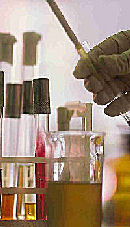Synthetic biology
Biotechnologists are beginning to move on from modifying organisms through changing their DNA (by genetic engineering) to building them from scratch. Synthetic biology refers to such creation of artificial life from raw materials. This new field is regarded by many experts as the next big thing in science, but one which may also have disastrous consequences if mishandled.

It was in the news in the UK last week as the result of a visit by the maverick US scientist, Craig Venter, who ran one of the two projects that mapped the human genome. He has hinted that his team has already created a minimal bacterial genome from its chemical building blocks and may shortly succeed in making an artificial organism. He attempted to allay the fears of critics, who worry that artificial life such as bacteria might escape into the environment and cause unpredictable consequences, or be used to make military bioweapons. The former eventuality has been called bioerror by the astronomer Sir Martin Rees, the president of the Royal Society. Other critics object on religious grounds, arguing that scientists ought not to “play God” by such experiments.
The term synthetic biology was first applied to this field of research in 2003 but is only slowly becoming known to the general public. A researcher is a synthetic biologist, a term that may make the humorists among us smile. Much more recent is synbio, its abbreviation, which is showing signs of becoming fashionable.
Synthetic biology can help in the fight against emerging infections, rather than aid the design of bio-weapons, controversial scientist Craig Venter has told reporters ... Synthetic biology could provide the most effective way of stopping infections in developing countries, such as malaria, and emerging drug-resistant superbugs.
BBC News, 24 Oct. 2007
Synthetic biology now occupies roughly the same space on the public’s radar that computing might have done in the 1960s or genetic modification in the 1970s — it’s largely unheard of by anyone except the scientific community and its geeky observers. But as the pace of breakthrough in this area quickens, the sense of being on the edge of an extraordinary technological revolution is giving even the scientists involved vertigo.
Guardian, 21 Oct. 2007
